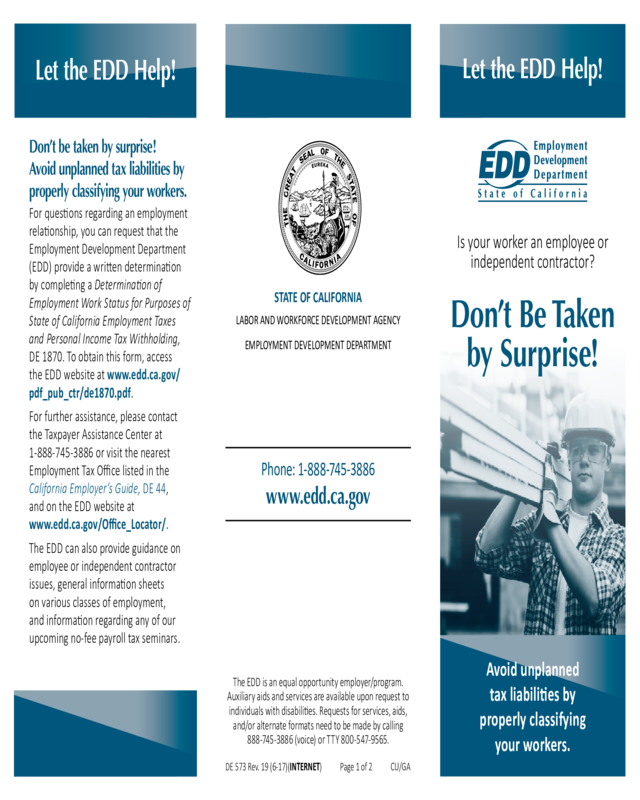Fillable Printable Avoid Unplanned Tax Liabilities (De 573)
Fillable Printable Avoid Unplanned Tax Liabilities (De 573)

Avoid Unplanned Tax Liabilities (De 573)

Don’t be taken by surprise!
Avoid unplanned tax liabilities by
properly classifying your workers.
For quesons regarding an employment
relaonship, you can request that the
Employment Development Department
(EDD) provide a wrien determinaon
by compleng a Determinaon of
Employment Work Status for Purposes of
State of California Employment Taxes
and Personal Income Tax Withholding,
DE 1870. To obtain this form, access
the EDD website at www.edd.ca.gov/
pdf_pub_ctr/de1870.pdf.
For further assistance, please contact
the Taxpayer Assistance Center at
1-888-745-3886 or visit the nearest
Employment Tax Oce listed in the
California Employer’s Guide, DE 44,
and on the EDD website at
www.edd.ca.gov/Oce_Locator/.
The EDD can also provide guidance on
employee or independent contractor
issues, general informaon sheets
on various classes of employment,
and informaon regarding any of our
upcoming no-fee payroll tax seminars.
The EDD is an equal opportunity employer/program.
Auxiliary aids and services are available upon request to
individuals with disabilies. Requests for services, aids,
and/or alternate formats need to be made by calling
888-745-3886 (voice) or TTY 800-547-9565.
DE 573 Rev. 19 (6-17)(INTERNET) Page 1 of 2 CU/GA
STATE OF CALIFORNIA
LABOR AND WORKFORCE DEVELOPMENT AGENCY
EMPLOYMENT DEVELOPMENT DEPARTMENT
Is your worker an employee or
independent contractor?
Avoid unplanned
tax liabilies by
properly classifying
your workers.
Let the EDD Help!
Don’t Be Taken
by Surprise!
Phone: 1-888-745-3886
www.edd.ca.gov
Let the EDD Help!

If you have a business and pay other people
to do work for you or on behalf of your
business, you may be surprised with an
unancipated tax liability if a worker you
consider to be an independent contractor
les a claim for Unemployment Insurance or
State Disability Insurance benets.
That worker may actually be an employee
and you would be responsible for
past and present employment
taxes for that individual.
A wrien contract
by itself may NOT
protect you
from liability.
The most important
factor in determining
whether a worker
is an employee
or independent
contractor:
Does the employer have the right to control
the manner and means by which the worker
performs his or her services?
Other key factors to consider are:
• The right to discharge the worker at will is
strong evidence of the right of direcon and
control of the worker.
• The worker is not in a disnct trade or
occupaon.
• The work is not highly skilled or specialized.
• The work is usually done under supervision.
• The worker does not provide the tools,
equipment, and place of work.
• The work is long term or connual, not an
isolated event.
• The worker is paid based on me
worked or piece rate.
• The work is not separate from the
regular work, business, or services
provided by the employer.
• The actual pracces of the working
relaonship between the pares are
dierent from the terms of their
independent contractor agreement.
• The worker has lile or no meaningful
discreon over how to do the job.
Employee by Specific
Statute of Law
A worker not considered to be a common
law employee may be a statutory
employee by law. Some examples are:
• Unlicensed construcon subcontractors
• Route salepersons
• Commission and agent drivers
Refer to Informaon Sheet:
Employment, DE 231.
The Common Law
Test for Employment
Unanticipated Tax Liability
Factors continued:
DE 573 Rev. 19 (6-17)(INTERNET) Page 2 of 2 CU/GA



